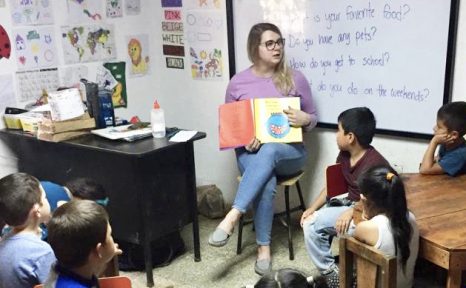
What does a teacher do when a student enters the classroom from an oral language tradition with little knowledge of reading or writing? How does a system that ranks students by their ability to read and write measure the child’s true potential, or replace the pejorative “illiterate” with the acknowledgment that the student, in effect, is learning a third language? And how are the child’s broader needs being met?
These questions interest Anna Tussey, a ’13 Transylvania University graduate, as a language teacher at Louisville’s John F. Kennedy Montessori Elementary School, a researcher who has worked with Guatemalan-Maya students, the children of indigenous immigrants, and the new board chair of a nonprofit called the Guatemalan Educational Outreach.
Tussey’s drive to understand people and cultures different from her own began in kindergarten, when her parents enrolled her in a Spanish immersion program, and continued through high school at Bryan Station. She says she still feels the impact of the program.
At Transy, she majored in Spanish as well as in sociology-anthropology, adding a minor in English. She also played violin in the orchestra. She relished an expansive, humanities-based education.
“Going to a liberal arts school, where I didn’t feel that I had to pigeonhole myself into one career path, gave me the opportunity to learn about a lot of different fields which are now all coming together,” she reflects. Upon graduating, she found herself prepared for every step of her career.
While pursuing a master’s degree in American studies at Kennesaw State University, she worked full time as a bilingual data collector for a research project with the Georgia Department of Education, talking with students who spoke English and Spanish. She also became a research assistant for the Maya Heritage Institute, “which is what inspired my master’s thesis,” she says, and the article that was published last July: Maya Indigeneity in the Public School System: Institutional Barriers between Educators and Students.
Throughout her journey, she has recognized how education shapes us into the nation we are and hope to become.
“I would argue that education, especially public education, is the foundation of how we reproduce our society, the ideas, culture and expectations we pass on to the next generation,” she says. It’s a fundamental reason why her long-term goals are to provide all students equal access to the education and resources they need.
As a future policy maker, something she hopes to undertake after gaining experience in the classroom, Tussey wants to remove the barriers that preclude an equitable education for immigrant students and children of immigrants.
“Even outside language barriers, culturally, there are a lot of deficits that are not addressed appropriately,” she says of the limited resources or the way in which resources are expended. “Ultimately it makes educational attainment very unequal in comparison.”
For Tussey, the ability — and the desire — to relate to people, to see their humanity instead of geography, creates an open, more flexible approach. Being familiar with many cultures helps to clarify your own, she says, and makes it easier to work in different spaces and with a variety of people.
My entire educational and professional experience has always been with cultures outside of my own.
Anna Tussey ’13
Now in her third year of teaching, Tussey is pursuing her second master’s degree, this one in teaching English to speakers of other languages. She recently returned from her first visit to the Little Mountain School in Joya Honda, Guatemala, a program of the Lexington-based nonprofit Guatemalan Educational Outreach.
“When I left Atlanta, I knew I would miss my involvement with the Guatemalan-Maya population,” she notes. “It had been a very intense part of my life.” Volunteering as the board chair keeps her connected.
“My entire educational and professional experience has always been with cultures outside of my own,” she concludes, weighing its value. “It doesn’t just make you comfortable working around people, but makes you very successful, because you know how to adapt yourself, to communicate and build relationships effectively.”

